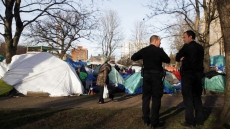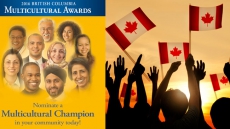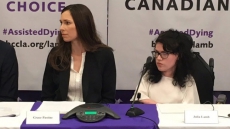OTTAWA — What's your secret wish?
That's the first question teacher Winnie Canuel asks her students at the start of English as a second language classes at her Edmonton school.
For Abu Bakr al Rabeeah, an Iraqi refugee from Syria, there were two answers. First, he wanted to be a soccer player. But second, and perhaps more urgently, he wanted to tell his story.
This week, that wish was realized in a way the soft-spoken 15-year-old never imagined: it was published in a book.
Al Rabeeah and Canuel began working together last fall, about six months after his family arrived in Canada as 10 of the 23,000 Iraqi refugees who've settled here since 2009.
As they talked, he relayed stories of his early childhood in Iraq, such as being slapped in the face by his Grade 2 teacher for being a Sunni Muslim.
Escalating tensions between Sunnis and Shias forced his family to flee Iraq and seek refugee status in Syria in 2010.
The next year, the Syrian civil war broke out. Every night at dusk, he told Canuel, a sniper would climb to the roof of his family's apartment building and use it as a base to fire at anti-government rebels living in the streets below.
His family lived with the war for three years before being brought to Canada via the United Nations.
During their discussions, his English grew stronger and so did his confidence. In Canuel, he said, he found a teacher he'd never have encountered at home.
"I trusted her," he said.
Canuel had long thought about writing a book of her own, telling friends she was waiting for the right story to find her. In listening to al Rabeeah talk about his family and his experiences, she found it.
"Yes, there are massacres and car bombs in his background, yet it's ultimately about a love of a family and the resiliency of the human experience, that is what we should carry away from this," she said.
"That's universal."
The novel they wrote together, called "Homes," is now for sale in Edmonton bookstores and online.

For al Rabeeah, the goal is to help people understand that behind all the Syrian refugees now coming into Canada there are stories. Too many people only see him as a refugee, he said.
"It makes me feel outside of the community, not with them," he said.
Canuel said she's lucky. Her school gave her the time and the money to work one-on-one with al Rabeeah and he arrived long before the influx of Syrian refugees began challenging schools across the country.
About 60 per cent of Syrians are under 14, placing unprecedented pressure on the system.
The Calgary Board of Education has seen 414 Syrians enrol, the equivalent of an entire new school. The $2.6 million to help them came out of the board's existing budget, forcing changes elsewhere, like increases in class sizes.
"Given that they have some significant complex needs and they are war-torn, traumatized, and require significant supports, we are frustrated in the fact that neither the provincial nor the federal government is taking responsibility to assist school boards in working with these students," Joy Bowen-Eyre, a member of the Calgary board, recently told a parliamentary committee.
In the Peel Region board outside Toronto, where the first language of 60 per cent of students isn't French or English, educators are being equally challenged.
"Most of the students in grades 3 and up have large gaps in education due to limited prior schooling," Zaiba Beg, the co-ordinator for the board's ESL programs, told the committee.
"As a result, they require more intensive programs in order to accelerate their learning."




